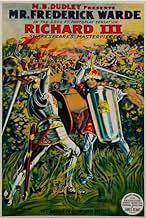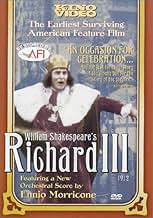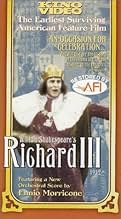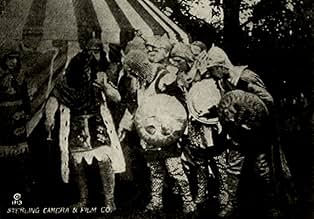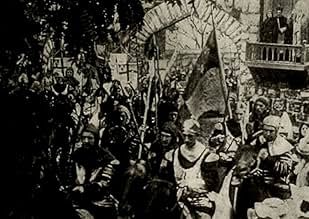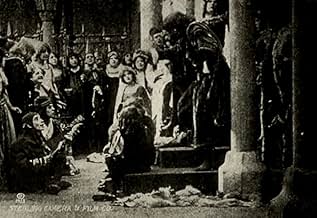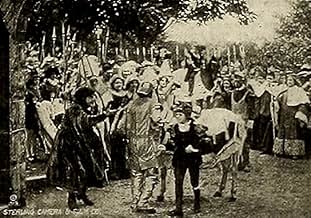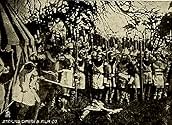Ajouter une intrigue dans votre langueRichard of Gloucester uses manipulation and murder to gain the English throne.Richard of Gloucester uses manipulation and murder to gain the English throne.Richard of Gloucester uses manipulation and murder to gain the English throne.
- Réalisation
- Scénario
- Casting principal
Avis à la une
The viewer would do well to compare this film with Frank Benson's British film of the same play released in 1911, one year before Warde's. Both the similarities and differences are illuminating. The costumes are of course very similar--it would be years before modern dress Shakespeare would get onto film. The way the scenes of Edward's court are set are very similar. Such scenes were the staple of Victorian Shakespeare. Both films use narrative title cards to explain to the viewer what is going on; later in the silent era they would contain dialogue more than narration. The similarities show us what was the state of Shakespearean production and cinema standards at the time.
The major difference that one sees is that Benson tries to put you in row fifteen of the Drury lane theatre during one of his performances. The camera never moves and every shot is a long shot. You can't see Benson's face in any of them. All have what is clearly a stage set behind them, and the actors move from side to side primarily because they feel constrained by the backdrop and the footlights.
Warde's approach is best shown in a scene where Richard is riding to the Tower to do in Henry VI. It is shot outside on location. The camera is raised above head level. Richard rides from the distance toward the camera passing behind the camera to the right. It is a scene only possible in film; you could never see such a thing on stage.
Warde's camera is consistently closer to the action than Benson's so that the actor's faces are usually visible. He makes use of high level cameras to see Richard on a balcony and a crowd below and intercuts these with interiors so that one imagines the balcony to be attached to the interior.
In other words, the scenes here are conceived cinematically not theatrically. Warde was not the first to do this even in a Shakespeare film but it does make his film easier and more interesting to watch than his contemporary's.
Alas, his characterization of Richard leaves something to be desired; he stomps about like a troll from a Brothers Grimm story. Before closeups became standard, the only tool an actor could use in a silent film was his bodily movement, and Warde's lacks the subtlety to convey anything more than a caricature. As a result the film, despite being of historical interest, reasonably well paced and shot with a cinematic eye, will fail, I think, to really grip most modern viewers' interest.
The major difference that one sees is that Benson tries to put you in row fifteen of the Drury lane theatre during one of his performances. The camera never moves and every shot is a long shot. You can't see Benson's face in any of them. All have what is clearly a stage set behind them, and the actors move from side to side primarily because they feel constrained by the backdrop and the footlights.
Warde's approach is best shown in a scene where Richard is riding to the Tower to do in Henry VI. It is shot outside on location. The camera is raised above head level. Richard rides from the distance toward the camera passing behind the camera to the right. It is a scene only possible in film; you could never see such a thing on stage.
Warde's camera is consistently closer to the action than Benson's so that the actor's faces are usually visible. He makes use of high level cameras to see Richard on a balcony and a crowd below and intercuts these with interiors so that one imagines the balcony to be attached to the interior.
In other words, the scenes here are conceived cinematically not theatrically. Warde was not the first to do this even in a Shakespeare film but it does make his film easier and more interesting to watch than his contemporary's.
Alas, his characterization of Richard leaves something to be desired; he stomps about like a troll from a Brothers Grimm story. Before closeups became standard, the only tool an actor could use in a silent film was his bodily movement, and Warde's lacks the subtlety to convey anything more than a caricature. As a result the film, despite being of historical interest, reasonably well paced and shot with a cinematic eye, will fail, I think, to really grip most modern viewers' interest.
Watching Shakespeare without dialog isn't as challenging as you might think. Indeed, this 1912 film manages to condense the play neatly and still retains much of the power of the piece without hearing - or even reading - the words. Much of the success of "Richard III" is due to the vivid characterization by Frederick Warde, but his costars are excellent too. The direction is basic, of course, and every so often director-star James Keane wastes precious time (what's up with that long semi-tracking shot of the ship?), but generally his work is more than adequate. Comparing Keane's work here to the pioneering 1911 Italian feature "L'Inferno", it's clear that the American did have knowledge of what was going on elsewhere, even if he (of course) fell far short of what D.W. Griffith was already doing. Overall, "Richard III" will be of considerable interest to silent-film fans as well as stage performers interested in viewing the work of 19th century master Warde. Otherwise, I doubt this movie will thrill many other viewers. But I could be wrong; check it out for yourself.
Historically important as it is the oldest known complete surviving feature film made in the US, Richard III does a decent enough job of making Shakespeare's play accessible to the masses - although watching a Shakespeare play without words is like looking at a portrait in a dark room. The faces pulled by Shakespearean stage actor Frederick Warde suggest he thinks he's still playing to the Gods.
This was a very, very early full-length film. According to the video box, it was the first full-length American-made film, but that is debatable--as several films have made that claim and exactly what constitutes "full-length" is pretty vague. Regardless, I have to commend the cast for trying something unique and epic, though in today's light the film is a totally boring mess and only of interest to cinephiles. Instead of the modern notion of story-telling and action, the crew was breaking new ground and made a bizarre film that appears more like a series of vignettes instead of a coherent film. Instead of a moving and evolving narrative like we are used to, the film was made with a real-life traveling acting troop. But, instead of having them act out the story, the film shows inter-title cards that describe what has occurred and the cast pose like they are going to be photographed or just make a few minimal movements or actions until the next card appears to describe an all-new scene. It's almost like looking at a series of stereoscope cards that move just a little and all together tell a very, very dull story. Very static and horrid to watch, it DID try something different and this is an amazingly important film historically--I just would NEVER want to have to watch it again!
After watching RICHARD III, I found the film endlessly fascinating. Part of the fascination lies in the age of the film itself. You rarely get to see a film from 1912 much less one in excellent condition. I felt as if I had gone back in time to a 19th century theatre which in effect I had as the actor playing Richard (Frederick Warde) was a legendary stage actor who came out of retirement to reprise his favorite role on film and have it captured for posterity. Much of RICHARD III is appropriately theatrical in nature with very theatrical sets but it is the exteriors that turn it into a real motion picture. Although the camerawork is static, the editing is imaginative and keeps it from being just a filmed play.
The DVD transfer of the film is remarkable. The color tints (mostly yellow and red) are effective and the print looks great for the vintage. The period intertitles are intriguing with Gloucester spelled phonetically (Gloster) for some reason. The commissioned score from Ennio Morricone is powerful, relentless, and highly effective. I strongly recommend this title to anyone interested not only in early movies but also in theatre history. This is a rare opportunity to see a genuine 19th century performance and the oldest surviving American feature film. However, be advised that this film isn't for everyone not even fans of Shakespeare. Now that the remains of Richard III have been found, the more discerning among you should give it a try in his honor...For more reviews visit The Capsule Critic.
The DVD transfer of the film is remarkable. The color tints (mostly yellow and red) are effective and the print looks great for the vintage. The period intertitles are intriguing with Gloucester spelled phonetically (Gloster) for some reason. The commissioned score from Ennio Morricone is powerful, relentless, and highly effective. I strongly recommend this title to anyone interested not only in early movies but also in theatre history. This is a rare opportunity to see a genuine 19th century performance and the oldest surviving American feature film. However, be advised that this film isn't for everyone not even fans of Shakespeare. Now that the remains of Richard III have been found, the more discerning among you should give it a try in his honor...For more reviews visit The Capsule Critic.
Le saviez-vous
- AnecdotesThought lost for decades, but a pristine print (believed to be the oldest known complete surviving feature film made in the US) was discovered by a private collector in 1996 and donated to the American Film Institute.
- ConnexionsFeatured in Keepers of the Frame (1999)
Meilleurs choix
Connectez-vous pour évaluer et suivre la liste de favoris afin de recevoir des recommandations personnalisées
Détails
- Date de sortie
- Pays d’origine
- Langues
- Aussi connu sous le nom de
- Mr. Frederick Warde in Shakespeare's Masterpiece 'The Life and Death of King Richard III'
- Lieux de tournage
- Sociétés de production
- Voir plus de crédits d'entreprise sur IMDbPro
Box-office
- Budget
- 30 000 $US (estimé)
- Durée55 minutes
- Mixage
- Rapport de forme
- 1.33 : 1
Contribuer à cette page
Suggérer une modification ou ajouter du contenu manquant

Lacune principale
By what name was Richard III (1912) officially released in Canada in English?
Répondre
